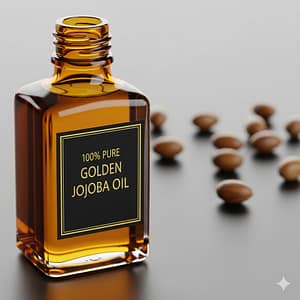- Home
- Jojoba Oil

I. General Information
A. Scientific Name:
Simmondsia chinensis
B. Alternative Names:
Jojoba wax, Liquid wax ester
C. Pronunciation:
/həˈhoʊbə ɔɪl/
II. Sourcing and Origin
A. Source:
A liquid wax extracted from the seeds of the jojoba shrub.
B. Geographic Origin:
Native to the Sonoran and Mojave Deserts of Arizona, California, and Mexico.
C. Method of Processing:
Extracted via cold-pressing of jojoba seeds.
Minimal refinement retains natural nutrients and a golden color.
III. Properties and Uses
A. Physical Properties:
A clear, golden, odorless liquid with a smooth, non-greasy feel.
B. Chemical Composition:
Composed of liquid wax esters rather than triglycerides (unique among plant oils).
Chemically similar to human sebum.
Rich in monounsaturated fatty acids (gadoleic, erucic, oleic).
Contains vitamin E, B-complex vitamins, and minerals (zinc, copper).
Naturally stable and resistant to oxidation (long shelf life).
C. Primary Uses:
Skincare: Balances oil production, non-comedogenic moisturizer, soothes acne, calms irritation, anti-aging benefits.
Haircare: Nourishes scalp, strengthens hair, prevents breakage, adds shine.
Wellness: Gentle carrier oil for essential oils, used in massage therapy.
Culinary: Not traditionally used as food (considered non-digestible for humans).
Household: Ingredient in natural cosmetics, salves, and polishes.
D. Key Benefits:
Non-comedogenic (won't clog pores), highly compatible with the skin, moisturizing, and helps to balance oil production.
IV. Safety and Considerations
A. Potential Allergies:
Allergies are extremely rare.
B. Best Practices for Use:
Use 100% pure, cold-pressed jojoba oil. A little goes a long way.
C. Special Precautions:
Generally safe for topical use.
Rare allergic reactions may occur in sensitive individuals.
Not for internal consumption (can cause indigestion or adverse effects if ingested).
V. Fun & Educational Facts
A. Historical Context:
B. Did You Know?
C. DIY Recipe Idea:
Simple Facial Cleansing Oil - Use a few drops of pure jojoba oil to gently massage into your skin to break down makeup and impurities. Wipe away with a warm, damp cloth.
